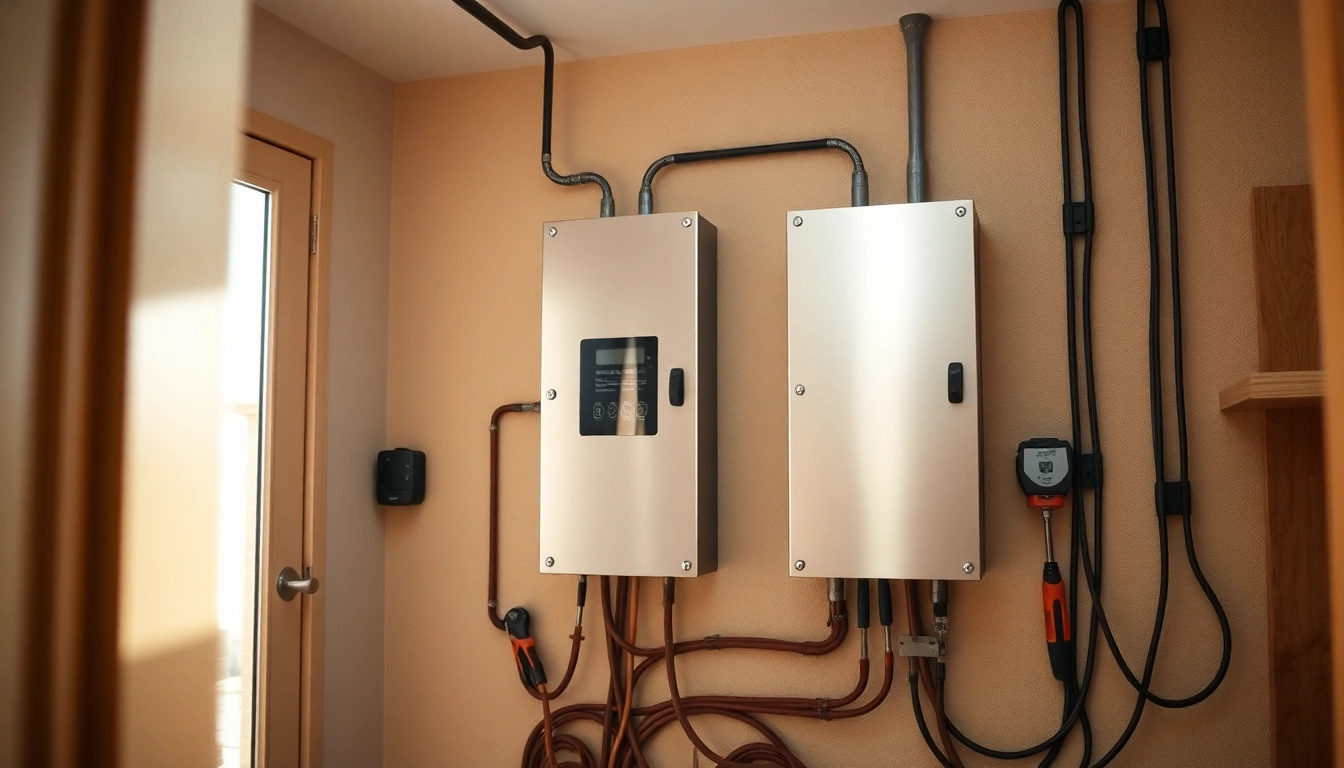Introduction to Electrical Panels
In every home, the electrical panel serves as a critical component that governs how electricity is distributed throughout the premises. An electrical panel, sometimes referred to as a breaker box or fuse box, is responsible for controlling the flow of electricity to various circuits. Understanding the function and importance of this system in your home is vital for ensuring both safety and efficiency.
What is an Electrical Panel?
An electrical panel is a metal box that houses circuit breakers or fuses. It connects the electrical system of a building to the external power supply. The panel receives electricity from the utility company, then distributes it to different circuits within the home while ensuring overload protections through circuit breakers. These devices automatically shut off when they detect conditions that could lead to overheating or electrical fires, providing an essential safety mechanism.
The Role of an Electrical Panel in Your Home
The electrical panel acts as the heart of your electrical system, channeling power to various areas and appliances of your home. This distribution of electricity is essential for powering lights, heating/cooling systems, appliances, and other electronic devices. Each circuit connected to the panel serves a specific area or function; for example, some circuits may power household lighting, while others may supply power to kitchen appliances or home entertainment systems. Thus, the panel plays a fundamental role in dividing and controlling electrical power efficiently and safely.
Common Types of Electrical Panels
There are several types of electrical panels used in residential applications, each with specific functionalities and capacities:
- Main Breaker Panels: These panels control the power supply to the entire home, featuring a single main switch that shuts off power to all circuits.
- Subpanels: Subpanels are used to distribute power to specific areas of larger homes. They reduce the load on the main panel and provide greater flexibility in circuit placement.
- Combination Panels: These units combine both circuit breakers and fuses in one enclosure, which can accommodate diverse wiring needs.
- Smart Panels: New technology has introduced smart panels that allow homeowners to monitor energy consumption and optimize usage through apps or connected devices.
Signs It’s Time to Upgrade Your Electrical Panel
Upgrading an electrical panel is essential for maintaining a safe and efficient electrical system. Here are several signs that indicate it may be time for an upgrade:
Increased Electrical Demands in Modern Homes
As technology evolves, so do the electrical demands of our homes. From energy-hungry appliances to a growing number of electronic devices, homeowners are utilizing significantly more electricity than in previous decades. Modern homes often feature numerous energy-efficient amenities and smart devices, all requiring a stable and adequate power supply. If the existing electrical panel is underpowered, homeowners may experience tripped breakers or insufficient supply during peak usage times.
Age and Condition of Your Current Panel
If your electrical panel is over 20 years old, it might not meet current electrical codes or standards. Older panels, especially those from the 1960s and 1970s, were often installed with safety weaknesses that may not properly handle today’s electrical loads. Furthermore, panels that show signs of rust, corrosion, or heat damage should be inspected and potentially replaced to avoid safety hazards associated with aging infrastructure.
Signs of Wear: Flickering Lights and Circuit Breaker Trips
Frequent flickering lights or circuit breakers that repeatedly trip indicate issues with the electrical panel. These signs often mean that the panel is struggling to provide adequate electricity to meet the demands of the home. Not only do these symptoms lead to inconvenience, but they can also pose serious safety risks, potentially leading to electrical fires or appliance damage.
Benefits of Upgrading Your Electrical Panel
Upgrading your electrical panel can provide numerous benefits, enhancing both safety and efficiency in your home. Here’s a closer look:
Enhanced Safety Features
Modern electrical panels feature advanced safety mechanisms, such as ground fault circuit interrupters (GFCIs) and arc fault circuit interrupters (AFCIs), which greatly reduce the risk of electrical hazards. Upgrading your panel ensures these critical safety features are present, minimizing the chances of electrical fires or shocks.
Improved Electrical Efficiency
New electrical panels are designed to distribute power more efficiently, often allowing for easy integration of renewable energy sources or electric vehicle charging stations. An upgraded panel can lower energy costs and enhance overall energy usage, making your home more environmentally friendly and reducing expenses over time.
Increased Property Value
A home with a modern, upgraded electrical panel is more attractive to potential buyers. Real estate investments often come with an expectation of compliant and updated electrical systems. Thus, enhancing your facilities through panel upgrades not only boosts your residence’s safety but can also positively impact its market value.
The Process of Upgrading an Electrical Panel
The process of upgrading an electrical panel involves specific steps to ensure safety and compliance with local codes. Below is a guide to navigate the upgrade process:
Choosing the Right Size and Type of Panel
Selecting the appropriate electrical panel is crucial for your home’s needs. When considering a new panel, evaluate the following:
- Amperage Rating: Common residential panels range from 100-400 amps. The choice depends on the size of your home and the electrical load requirements. Homes with extensive appliances may need a higher rating.
- Type: Decide between main breaker panels, subpanels, or smart panels based on your specific needs. Assess how you typically use electricity and plan for future expansions for even greater energy demands.
Hiring Professionals vs. DIY Upgrades
While some homeowners may opt to tackle the electrical panel upgrade as a DIY project, it is generally recommended to hire licensed electricians due to the complexity and risks involved. Professional electricians ensure that the installation adheres to local codes and regulations, and they possess the expertise to tactfully manage electrical load calculations and panel configurations.
Cost Considerations for Upgrading
The cost of upgrading an electrical panel can vary significantly, depending on several factors including:
- Panel Size: Larger and more advanced panels will naturally cost more.
- Installation Complexity: The condition of existing wiring and the layout will impact labor costs.
Average costs can range from $1,500 to $3,000, factoring in both labor and materials. It’s advisable to obtain multiple estimates from licensed electricians to ensure the best value.
Maintenance Tips for Your Electrical Panel
Once you upgrade your electrical panel, regular maintenance is essential to ensure its ongoing safety and functionality. Here are some practical maintenance tips:
Regular Inspection and Testing
Implementation of regular inspections can prevent potential hazards before escalating into serious issues. Homeowners should visually inspect the panel for signs of wear or damage, such as burnt or discolored wiring. Additionally, periodic testing of circuit breakers and GFCIs ensures they respond as expected in emergencies.
Keeping Your Panel Clean and Accessible
Maintaining a clean panel environment is crucial. Dust and debris can accumulate, affecting performance and safety. Ensure that the area around your panel is accessible and free of clutter. Regular cleaning with a damp cloth (while the panel is turned off) can help keep dust at bay.
Understanding Your Circuitry and Breakers
Familiarizing yourself with your electrical panel’s circuit layout can help effectively manage the system. Labeling circuits based on their use can facilitate easy troubleshooting when issues arise. Keeping an updated diagram or list near the panel can save time and frustration during emergencies.
Conclusion
Understanding the importance of electrical panels and recognizing when to upgrade is vital for maintaining the safety, efficiency, and value of your home. The electrical panel is a cornerstone of your home’s electrical system, and ensuring it is modern and well-maintained contributes significantly to your household’s overall well-being.



